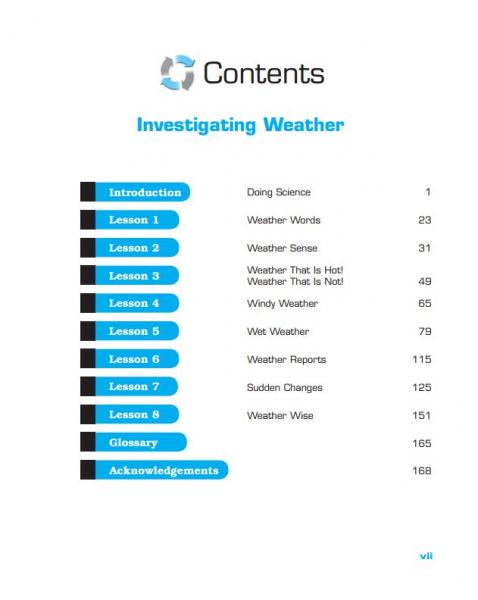EARTH & SPACE SCIENCE-Students begin this module by using their senses to observe and describe the weather around them. From their sensory observations, students identify patterns, such as seasonal changes, and general weather conditions. Because sensory data usually are not accurate, students use tools, such as thermometers, rain gauges, and wind speed indicators, to describe weather conditions accurately. Teams of students use the tools to collect data of changes in the weather over time and then use their data to describe and compare changes in the weather from day to day.
BSCS Science T.R.A.C.S. includes a comprehensive Student Guide and resource book at every level, 1-5. The Student Guide is not a "read-about-science" book; rather, it serves as a guide to help students learn to do the following things.
- Conduct scientific inquiries within a collaborative team and on their own
- Become more responsible for their own learning
- Manage the hands-on activities themselves
- Structure collaborative learning tasks
- Develop science and technology concepts and skills
- Reflect on their learning and assess their own conceptual and skill development
- Conduct independent inquiries related to questions or topics of personal interest
- Develop skills for reading in the content areas
- Follow and interpret directions
In addition, the Student Guides reinforce components of basic literacy, including shared reading and writing, guided reading and writing, continuous assessment, skills instruction, reading procedural text, listening and speaking skills, journal writing, record keeping, hints and reminders, reading and writing in a social context, and reading and writing in a content area.

Biological Sciences Curriculum Studies-10789
BSCS (Biological Sciences Curriculum Studies) Science Learning is a nonprofit organization committed to transforming science education so that all students have an opportunity to learn science in their daily lives and careers. For over 60 years, BSCS Science Learning has filled classrooms around the country with research-driven textbooks, pioneered effective teaching approaches, developed new education leaders, and conducted studies that will continue to alter the course of our science education system. Most importantly, they have championed the cause for meaningful, inquiry-based science learning.
 RETURN TO SEARCH RESULTS
RETURN TO SEARCH RESULTS
 RETURN TO SEARCH RESULTS
RETURN TO SEARCH RESULTS